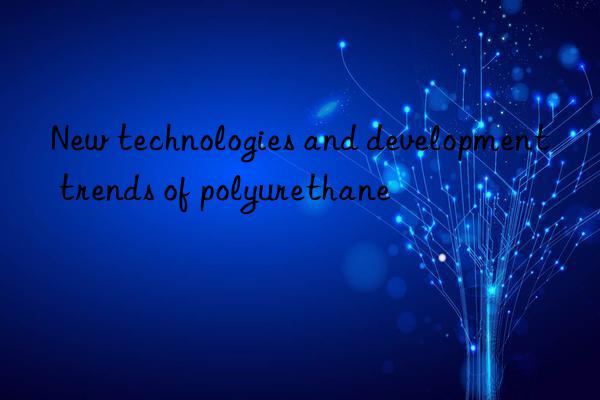
1. The production capacity of raw materials is further expanded
The rapid development of China's polyurethane industry has led to the growth of demand for main raw materials. Based on the expansion of production in recent years, TDI, MDI and polyether polyol companies have Some companies are planning further expansion.
About aliphatics For diisocyanates, Bayer has built an HDI production line with an annual output of 50,000 tons in Jinshan Chemical Park in Shanghai; Japan's Asahi Kasei is building an HDI production line in Nantong, Jiangsu; China's Yantai Wanhua is building an H12MDI production line; Gansu Yinguang is building an HDI production line Production lines; all reach the scale of 10,000 tons.
2, New raw materials The use of
In recent years, continuous production of polyether polyol and polymer polyol technology has been widely used. The technology of using bimetallic catalysts to replace potassium hydroxide to produce higher molecular weight polyether polyols has been used by large polyether manufacturers. The polyether polyols produced by this method have lower unsaturation and functionality similar to the design value. Mainly used for soft foam, microcellular elastomers and elastomers, the performance of polyurethane is significantly improved compared to polyether polyol-based polyurethane produced with alkali catalysts. Bayer Company successfully used the DMC catalyst continuous method to mass-produce low-unsaturation polyether polyols in July 2006 in Texas, USA. Domestic and foreign research is actively conducted on using low-unsaturation polyether polyols to replace or partially replace PTMEG in the preparation of polyurethane elastomers. In some applications, the replacement rate has reached 80%. Application in sealants shows higher elongation and heat and moisture resistance than ordinary polyether polyols.
In addition, polyether In the production of propylene oxide, an important raw material for polyols, the technology of using hydrogen peroxide to catalyze the oxidation of propylene to produce propylene oxide (HPPO) has matured and is the world's苐A 300,000-ton propylene oxide production unit using this method was built in Antwerp, Belgium, in 2008 by BASF, Dow and Solvay.
In the production of isocyanate, high-efficiency and low-energy consumption technology and non- Phosgene technology has always been a research hotspot. Bayer Company has successfully developed a TDI gas phase production process and applied it to its newly built TDI production device in Shanghai. It is expected to save more than 1/3 of the energy.
Yantai Wanhua Through a combination of independent research and development and cooperation with scientific research institutions, Polyurethane Co., Ltd. has solved the key technical problems of MDI and successfully developed MDI production technology with a scale of more than 160,000 tons/year, becoming the world's 苐5 companies with MDI independent intellectual property rights.
Chinese few Individual TDI manufacturers, especially Cangzhou Dahua and Gansu Yinguang, have continuously improved their original processes. TDI technology has made great progress and the operating rate has increased. For example, Yinguang Juyin Company in Lanzhou, Gansu Province has also successfully developed its own 50,000-ton TDI production technology and successfully transformed the original 20,000-ton TDI device capacity into a 50,000-ton capacity.
In recent years, special Isocyanates such asNDI, PPDI, etc. are already produced in small scale by domestic manufacturers. Some of these manufacturers use "biphosgene" or "triphosgene" technology to eliminate the hazards of gas phosgene.
3.Vegetable oil and other raw materials Further development of material-based polyols
The upstream raw materials of traditional polyols are mostly derived from resources such as oil and natural gas. However, with the energy shortage crisis and people's increasing awareness of environmental protection, the development of The use of renewable resources to manufacture biomass polyols and then produce"green" polyurethane materials has become a new highlight. At present, the raw materials for preparing biomass polyols mainly include vegetable oil (including�Contains hydroxyl groups, which can form intramolecular six-membered hydrogen bonds with the carbonyl group of carbamate,Greatlyreduces the hydrophilicity and hydrolyzability of the product , which makes up for the weak bond structure in conventional PU molecules in terms of molecular structure. It has excellent chemical resistance, hydrolysis resistance and permeability resistance. The raw materials used are not moisture sensitive, and the raw materials are easy to store and process. , and the preparation raw materials no longer use toxic isocyanates, and can also be modified with epoxy groups.
NIPU has gradually realized industrial production in Europe and the United States in recent years. The American Eurotech company is in a very important position in the production and research and development of NIPU status, NIPU has been successfully used in coatings, adhesives and sealants and other fields. The development of NIPU in my country is still in its infancy.
7,Other technological developments
Environmentally friendly polyurethane, especially water-based polyurethane, is developing rapidly.
Low-emission polyurethane foam seat cushions for automobiles have received attention.
The issue of flame retardancy has received further attention, and new flame-retardant polyurethane materials are being developed and gradually introduced to the market.
Spray polyurea and spray polyurethane urea have been widely used in markets such as protective wear-resistant coatings and waterproof coatings.
The recycling of waste polyurethane products has also received attention.



 微信扫一扫打赏
微信扫一扫打赏
